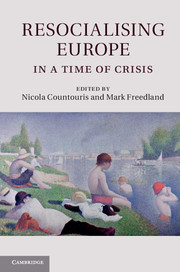22 results
19 - The EU, Competition Law and Workers Rights
-
-
- Book:
- The Cambridge Handbook of Labor in Competition Law
- Published online:
- 05 May 2022
- Print publication:
- 26 May 2022, pp 280-297
-
- Chapter
- Export citation
Regulatory and Jurisprudential Perspectives on Platform Work: The UK Case
-
-
- Book:
- Platform Work in Europe
- Published by:
- Intersentia
- Published online:
- 22 February 2022
- Print publication:
- 27 September 2021, pp 153-170
-
- Chapter
- Export citation
36 - The Sharing Economy and EU Anti-discrimination Law
- from Section 8 - Anti-discrimination Law
-
-
- Book:
- The Cambridge Handbook of the Law of the Sharing Economy
- Published online:
- 12 November 2018
- Print publication:
- 22 November 2018, pp 486-498
-
- Chapter
- Export citation
Copyright page
-
- Book:
- Resocialising Europe in a Time of Crisis
- Published online:
- 05 October 2013
- Print publication:
- 10 October 2013, pp iv-iv
-
- Chapter
- Export citation
Resocialising Europe in a Time of Crisis - Half title page
-
- Book:
- Resocialising Europe in a Time of Crisis
- Published online:
- 05 October 2013
- Print publication:
- 10 October 2013, pp i-i
-
- Chapter
- Export citation
Preface
-
- Book:
- Resocialising Europe in a Time of Crisis
- Published online:
- 05 October 2013
- Print publication:
- 10 October 2013, pp ix-xi
-
- Chapter
- Export citation
Dedication
-
- Book:
- Resocialising Europe in a Time of Crisis
- Published online:
- 05 October 2013
- Print publication:
- 10 October 2013, pp ii-ii
-
- Chapter
- Export citation
Index
-
- Book:
- Resocialising Europe in a Time of Crisis
- Published online:
- 05 October 2013
- Print publication:
- 10 October 2013, pp 504-525
-
- Chapter
- Export citation
Contents
-
- Book:
- Resocialising Europe in a Time of Crisis
- Published online:
- 05 October 2013
- Print publication:
- 10 October 2013, pp v-viii
-
- Chapter
- Export citation
Part II - Addressing precariousness in work
-
- Book:
- Resocialising Europe in a Time of Crisis
- Published online:
- 05 October 2013
- Print publication:
- 10 October 2013, pp 189-350
-
- Chapter
- Export citation
Epilogue - Resocialising Europe – looking back and thinking forward
- from Part III - Reinventing the collective dimensions of Social Europe
-
-
- Book:
- Resocialising Europe in a Time of Crisis
- Published online:
- 05 October 2013
- Print publication:
- 10 October 2013, pp 493-503
-
- Chapter
- Export citation
Introduction - The myths and realities of ‘Social Europe’
-
-
- Book:
- Resocialising Europe in a Time of Crisis
- Published online:
- 05 October 2013
- Print publication:
- 10 October 2013, pp 1-16
-
- Chapter
- Export citation
Resocialising Europe in a Time of Crisis - Title page
-
-
- Book:
- Resocialising Europe in a Time of Crisis
- Published online:
- 05 October 2013
- Print publication:
- 10 October 2013, pp iii-iii
-
- Chapter
- Export citation
Part I - Social Europe and the crisis of idea(l)s
-
- Book:
- Resocialising Europe in a Time of Crisis
- Published online:
- 05 October 2013
- Print publication:
- 10 October 2013, pp 17-188
-
- Chapter
- Export citation
Part III - Reinventing the collective dimensions of Social Europe
-
- Book:
- Resocialising Europe in a Time of Crisis
- Published online:
- 05 October 2013
- Print publication:
- 10 October 2013, pp 351-503
-
- Chapter
- Export citation

Resocialising Europe in a Time of Crisis
-
- Published online:
- 05 October 2013
- Print publication:
- 10 October 2013
The European Union after the Treaty of Lisbon
-
- Book:
- The European Union after the Treaty of Lisbon
- Published online:
- 05 June 2012
- Print publication:
- 16 April 2012, pp vii-viii
-
- Chapter
- Export citation
Index
-
- Book:
- The European Union after the Treaty of Lisbon
- Published online:
- 05 June 2012
- Print publication:
- 16 April 2012, pp 321-333
-
- Chapter
- Export citation
Frontmatter
-
- Book:
- The European Union after the Treaty of Lisbon
- Published online:
- 05 June 2012
- Print publication:
- 16 April 2012, pp i-iv
-
- Chapter
- Export citation
Contents
-
- Book:
- The European Union after the Treaty of Lisbon
- Published online:
- 05 June 2012
- Print publication:
- 16 April 2012, pp v-vi
-
- Chapter
- Export citation



